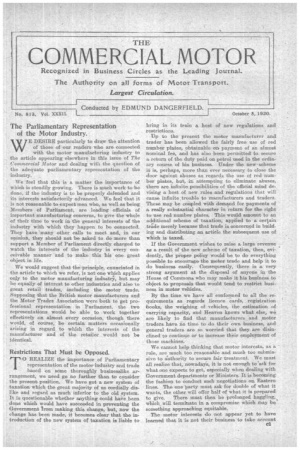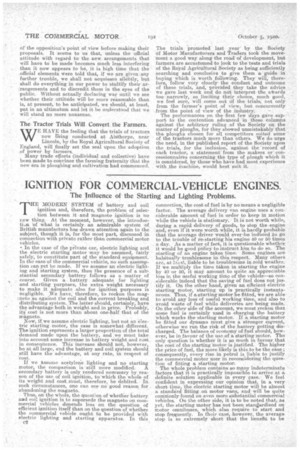. The Parliamentary Representation of the Motor Industry.
Page 1

Page 2

If you've noticed an error in this article please click here to report it so we can fix it.
WE-DESIRE particularly to draw the attention of those of our readers who are connected with the motor manufacturing industry to the article a.ppearing elsewhere in this issue of The Commercial Motor and dealing with the question of the adequate parliamentary representation of the industry.
We 'feel that this is a matter the importance of which is steadily growing. There is much work to be done, if the industry is to be properly .defended and its interests satisfactorily advanced. We feel that it is not reasonable to expect men who, as well as being Members of Parliament, are leading officials of important manufacturing concerns, to give the whole of their time to work in the general interests of the industry with which they happen to be connected. They have many other calls to meet and, in our opinion, they should not 'be asked to do more than support a Member of Parliament directly charged to watch the interests of the industry in every conceivable manner and to make this his one great ' object in life.
We would suggest that the'principle, enunciated in the article to which we refer, is not one which applies only to the motor manufacturing industry, but may be equally of interest to other industries and also to great retail trades, including the motor trade Supposing that the British motor manufacturers and the lIttotor Trades Association were both to get profeSsional representation in Parliament. the two representations would be able , to work together effectively on almost every occasion, though there would, of course, be certain matters occasionally arising in regard to which the interests of the manufacturer and of the retailer would not be identical.
Restrictions That Iviust be Opposed.
T0 REALIZE the importance of Parliamentary representation of the motor induStry and trade based on some thoroughly business.like arrangement, we need go no farther than tie consider the present position. We have got a new system of taxation which the great majority of us cordially dislike and regard as much inferior to the old system. It is questionable whether anything could have been done which would have succeeded in preventing the Government irom snaking this change, but, now the change has been made, it becomes clear that the introduction of the new system of taxation is liable to bring in its train a host of new regulations and restrictions.
Vip to the present the motor manufacturer and trader has been allowed the fairly free use of red number plates, obtainable on payment of an almost nominal fee, and has also been permitted to secure a return of the duty paid on petrol used in the ordinary course of his business. Under the new -scheme it is, perhaps, more than ever necessary to close the door against abuses as regards the use of red number plates, but, in attempting to eliminate abuses, there are infinite possibilities of the official mind devising a host of new rules and regulations that will cause infinite trouble to manufacturers and traders. These may be coupled with demand for, payments of a really substantial ehara.cter in return for the right to use red number plates. This would amount to an additional scheme of taxation, applied to -a certain trade merely because that trade is concerned in building and distributing an axticIe the subsequent use of which is taxed.
If the Government wishes to raise a large revenue as a result of the new scheme of taxation, then, evidently, the proper policy would be to do everything possible to encourage the motor trade and help it to do business easily. Consequently, there is a very strong argument at the disposal of anyone. in the House of Commons who may make it his business to object to proposals that would tend to restrict business in motor vehicles.
By the time we have all conformed to all the re: quirenaents as regard's licence cards, registration books, the weighing of vehicles, the estimation of carrying capacity, and Heaven knows what else, we are likely to find that manufacturers. and motor traders have /To time to do their own business, and general traders are so worried that they are diaindined to continue or to increase their employment of those machines. We cannot help thinking that motor interests, as a rule, are much too reasonable and much too submissive to authority to secure fair treatment. We must all realize that, no'waday's, it is' not enough to ask for what one expects to get,especially when dealing with Government departments or Ministers. It is becoming the fashion to Conduct such negotiations on Eastern lines. The one Party must ask for double of what it wants, the other, will offer half of what it is prepared to give. There must then be prolonged haggling,. which. will terminate in a, compromise which may be something approaching equitable. • The motor interests do not appear yet to have learned that it is not their business to take account of the opposition's point of view before making their proposals. It seems to us that, unless the official attitudewith regard to the new arrangements that will have to be made becomes much less interfering than it now appears to be, it. is high time that the official elements *ere told that, if we .a,re given any further trouble, we shall not acquiesce silently, but shall do everything in our power to stultify their .ar:".rangenaents and to discredit them in the eyes of the public. Without actually declaring war until we see' whether their attitude will be more reasonable than is, at present, to he anticipated, we should, at least, put in an ultimatum and let it be naderstood that We will stand no more nonsense.
The Tractor Trials Will Convert the Farmers.
E HAVE the feeling that the trials of tractors now Feing conducted at Aisthorpe, near Lineoln,by the Royal Agricultural Society of England, will finally set the seal upon the adoption „of pOWar by farmers. Many trade efforts (individual and collective) have been made to convince the farming fraternity that the new era in ploughing and cultivation had commenced.
The trials promoted last year by the Society of Motor Manufacturers and Traders took the movement a good way along the road of development, but farmers are accustomed-to look to the tests and trials of the Royal Agricultural Society as being sufficiently searching and conclusive to give them a guide in • buying which is worth following. They will, therefore, follow very closely the conduct and outcome of these trials, and, provided they take the advice we gave last week Mad do not interpret the acvards too narrowly, so limiting their .chotce, much good, we feel sure, will clothe out Of the trials, not :only from the farmer's point of view, but concurrently IrOm the point of view of the induStry,
The performances on the first few days gave support to the contention advanced in these columns against the arbitrary ruling of the Society on the matter of ploughs, for they showed unmistakably that theploog c o.sen for all competitors suited some of the tractors Much more than others. We do urge the need, in the published repert of the Society upon the -trials, for the inchisian, against the record of each tractor, a, statement from the makers or concessionnairea concerning the type of plough which it is considered, by those who have had most experience with .the Machine, would best suit it.




















































